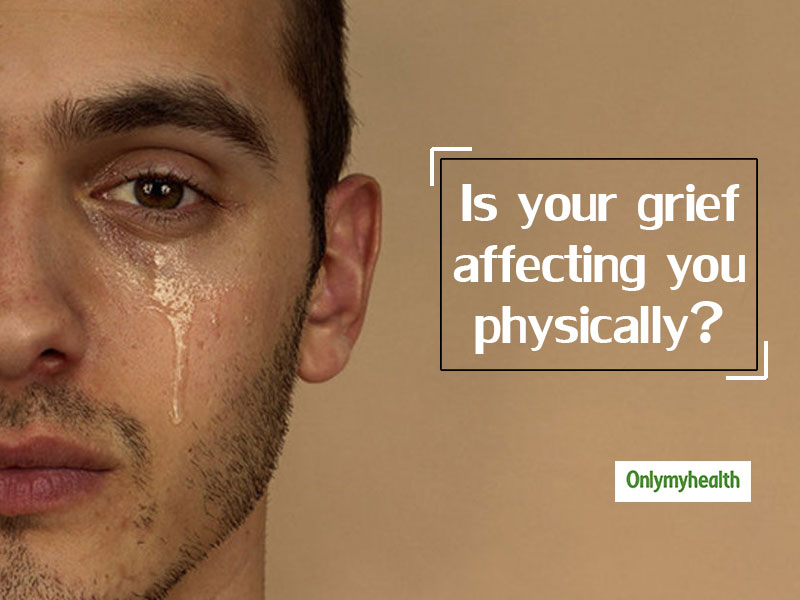
Grief or mourning is generally connected to the mental health of a person. In this, a person is not able to think and perform his daily task properly due to mental stress. But a new study has revealed the pain and health problem you suffer after losing someone or something is physical symptoms of grief.
What is grief?
Grief is a natural response to the loss of any important person and thing.
Many a time, grief is termed as mourning.
It is connected with the death of a closed one, losing a job, or and of a relationship.
Everyone has different grief period and experiences.
It is natural but if it extends for a longer time, it can result in chronic physical as well as mental problems.
Symptoms of Physical Grief

- Fatigue
- Tightness in chest or throat
- Irritability
- Nausea
- Dryness of mouth
- Difficulty in breathing
- Appetite imbalance
- Sleeping disorders
- Aches and pain in the whole body
- Extreme headache
- Disturbs the immune system
Types of grief
Also Read: How to Fight the Symptoms of Heart Failure
Most of the people take grief very lightly. Let us tell you to take depression due to grief is not normal. It is a chronic level of grief. It leads to many health complications ranging from cardiovascular disease to nervous system disease. There are two types of grief: normal and pathological
Normal grief
When someone suffers from normal grief, the sad thoughts and feelings generally occur in waves or bursts followed by a break. It does not take the further disorder of low mood and agony triggering major depression.
Self-esteem, capacity to get distracted or comfort and proper sense of humor help a person to be in normal grief stage.
Pathological grief

A form of persistent pervasive grief that does not get better normally. It hampers the ability of a person to accept the reality of a loss.
This increases the risk of health issues like depression, anxiety, sleep disorder, suicidal thoughts and behavioral disorder followed by degraded health.
Pathological grief is also known as complicated grief often requires a doctor consultation.
The difference between normal and complicated grief is that in complicated grief, people feel constant worthlessness and guilt whereas, in the normal one, there are break periods too.
Also Read: Heart Attack Warning Signs: Here Are The 5 Symptoms Visible On The Skin
How to deal with grief
Emotional and physical self-care is the key to dealing with any type of grief sadness and complications. Let’s know the ways to cope up with grief :
Make a move
Move physically as well as mentally. Go for a walk every day. If will not only help you tackle stress and depression but will also reduce anxiety. If you have a feeling of fatigue, join some yoga or exercise group to keep yourself motivated. With time, you will feel much better.
Yoga

Yoga is considered a significant health therapy. Its prominence is increasing day by day as it not makes your physique better but also helps in tackling mental disturbances. A study found that people who engage daily in yoga practices experience less inflammation and problems during grief.
Healthy food
With making a move, you also need to have a healthy diet. A healthy diet not only increases your energy level but also promotes a peaceful body inside out. Eat a lot of fresh fruits and vegetables and legumes and avoid junk food.
Hydrate yourself

Drink plenty of water to keep yourself hydrated. During the grief period, your body needs more hydration than normal.
Sleep schedule
Sleeping is the most important part of coping with any kind of stress and grief. Try to sleep at the same time everyday or in other word maintain a daily schedule of your sleeping and waking time. Avoid caffeine and alcohol which will affect your normal sleep schedule.
Social circle
Yes, this is a very important step. Talk to people who understand you like your close friend, parents siblings or anyone. The conversation is the best therapy to come out of grief. Go back to your social circle and organize a get together with your supportive ones. This will make you feel better.

Engage yourself
If you have spare time, your worries will increase and so the grief period. So take up new responsibilities and work on it. Keep yourself busy in productive work which will make you happy at the end of the day.
The essence of this whole tips is that you are the one who can make a change and can tackle grief lowering down its physical as well as mental symptoms. Take care of your health and mind. Start working on yourself as soon as possible. There is nothing in life which can not be cured.
Read more articles on Health News
How we keep this article up to date:
We work with experts and keep a close eye on the latest in health and wellness. Whenever there is a new research or helpful information, we update our articles with accurate and useful advice.
Current Version